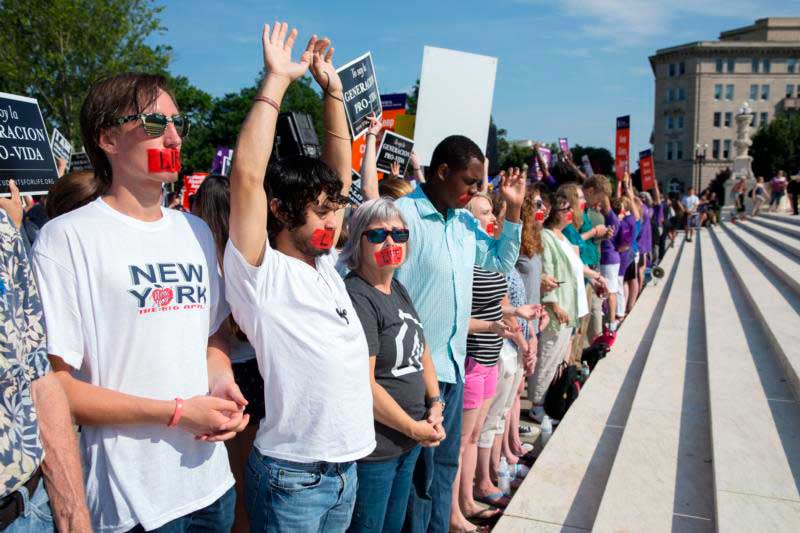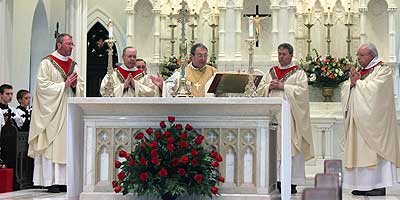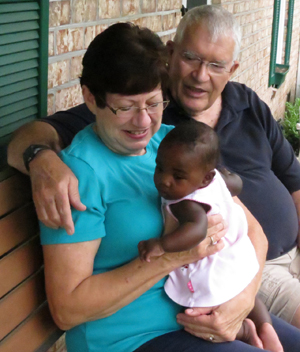
WASHINGTON—Just after 10 a.m. East Coast time on June 27 in Washington, D.C., Kristan Hawkins, director of Students for Life, made an announcement to her small rally in front of the Supreme Court:
“Women across America just lost!”
Her comments followed the high court issuing its 5-3 decision in Whole Woman’s Health v. Hellerstedt. The court struck down restrictions on Texas abortion clinics that required them to comply with standards of ambulatory surgical centers and required their doctors to have admitting privileges at local hospitals.
The case challenged a 2013 state law, H.B. 2, placing the requirements on the state’s abortion clinics. Opponents of the law claimed the requirements were aimed at closing abortion clinics. But the state and many pro-life advocates maintained that the law protected women’s health.
Justice Stephen G. Breyer wrote the majority opinion, joined by Justices Anthony M. Kennedy, Ruth Bader Ginsburg, Sonia Sotomayor and Elena Kagan. The same five had issued an earlier ruling allowing abortion clinics in Texas to remain operational until a final decision was handed down in the case.
The ruling was met with a sense of resignation by the few who were able to make speeches to barely 100 people at Hawkins’ pro-life rally before being drowned out by the adjacent rally. Numbering more than 2,000 in support of legal abortion, that group celebrated the decision as its loudspeakers blared Queen’s “We Are the Champions.”
“Reasonable people know that Texas law H.B. 2 was in the best interest of women’s health,” said Jeanne Mancini, president of March for Life.
“Today, women and women’s health are the real losers. Because of this decision today, beauty parlors, public pools and veterinary clinics will have higher health standards than abortion clinics.”
Said Hawkins, “It is within the rights of the states, indeed, it is the duties of the states, to protects its citizens from predatory businesses, which is exactly what the abortion industry is.”
“What we’ve seen today is another win for special interests in Washington, D.C.” said Genevieve Wood, a communications fellow at the Heritage Foundation. “Women did not win — the abortion industry did.”
Evangeline Bartz, a lawyer for Americans United for Life, said: “The Supreme Court has accepted the argument that the abortion industry should keep its profits high and their standards low.”
Hawkins sensed when she arrived that the numbers and noise level weren’t going to work in her favor. “They’re pretty aggressive today,” she told Catholic News Service about groups in favor of legal abortion gathered in front of the court.
She also claimed “they paid a bunch of people to show up,” explaining that before the rally at the court, she had seen many of those demonstrators organizing at nearby Union Station and receiving packets of materials on the abortion issue.
During a teleconference with news media after the decision was handed down, Father Frank Pavone, national director of Priests for Life, said the court “has basically sanctioned patient abandonment today.”
The decision “is true to the abortion industry and to their friends in government” and show “they care more about their own industry than the women they claim to be serving,” the priest said. “They are not serving women because there is no such thing as an abortion that does not harm the women who have it. Abortion does not harm women some of the time — it harms them all of the time.”
Also on the call was Rep. Jodie Laubenburg, the Texas lawmaker who wrote and introduced H.B. 2 in the Texas Legislature and helped it get passed.
She called it “a bad day for women and a sad day for our nation.”
“Women deserve the same standard of care at these abortion clinics as they would receive at a medical facility,” she said. “Obviously the politics of abortion supersedes the health and safety of women and that’s what we were fighting for in H.B. 2 — for the health and safety of women. I’m disappointed, but we are not defeated because we are going to keep working to protect women.”
Carol Everett, founder of the Heidi Group and a former abortion provider, spearheaded the inclusion of the law’s requirement that abortion clinics comply with standards of ambulatory surgical centers.
“This is an industry that will now be allowed to open substandard facilities all through the nation. Women will be preyed on and injured,” said Everett, whose nonprofit organization counsels post-abortive women and men and works with a nationwide network of pregnancy centers.
“Our responsibility is to help these women make good choices. Obviously we would help them choose life, but if they are going to walk to the door of an abortion clinic, we want them to have the highest standard of care available,” she added. “The pro-life movement once again has been the one to stand at the front line standing there to protect the health of women.”
Kurt Jensen / Catholic News Service
Contributing to this story was Ana Franco-Guzman
CNS photo/Michael Reynolds, EPA: Pro-life supporters pray at the steps of the U.S. Supreme Court on June 27 during protests in Washington, D.C.. In a 5-3 vote that day, the U.S. Supreme Court struck down restrictions on Texas abortion clinics that required them to comply with standards of ambulatory surgical centers and required their doctors to have admitting privileges at local hospitals.



